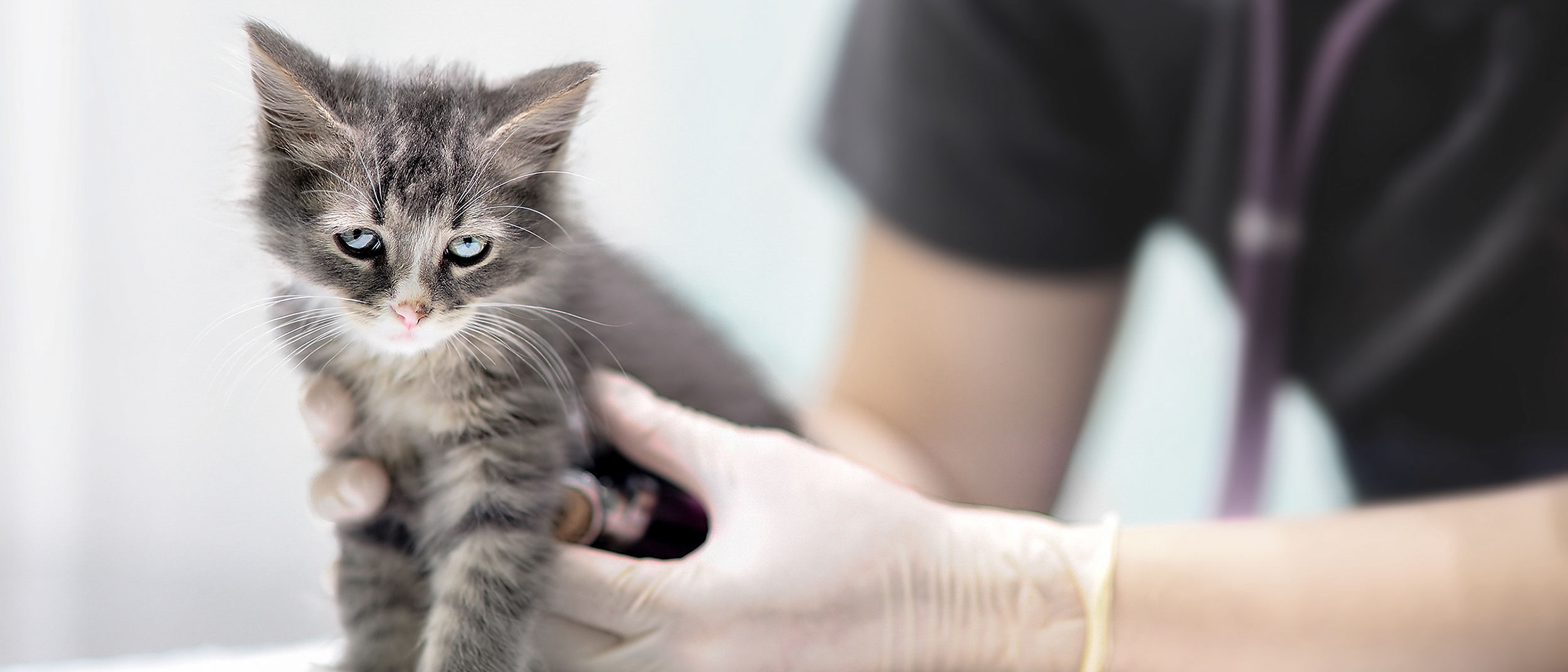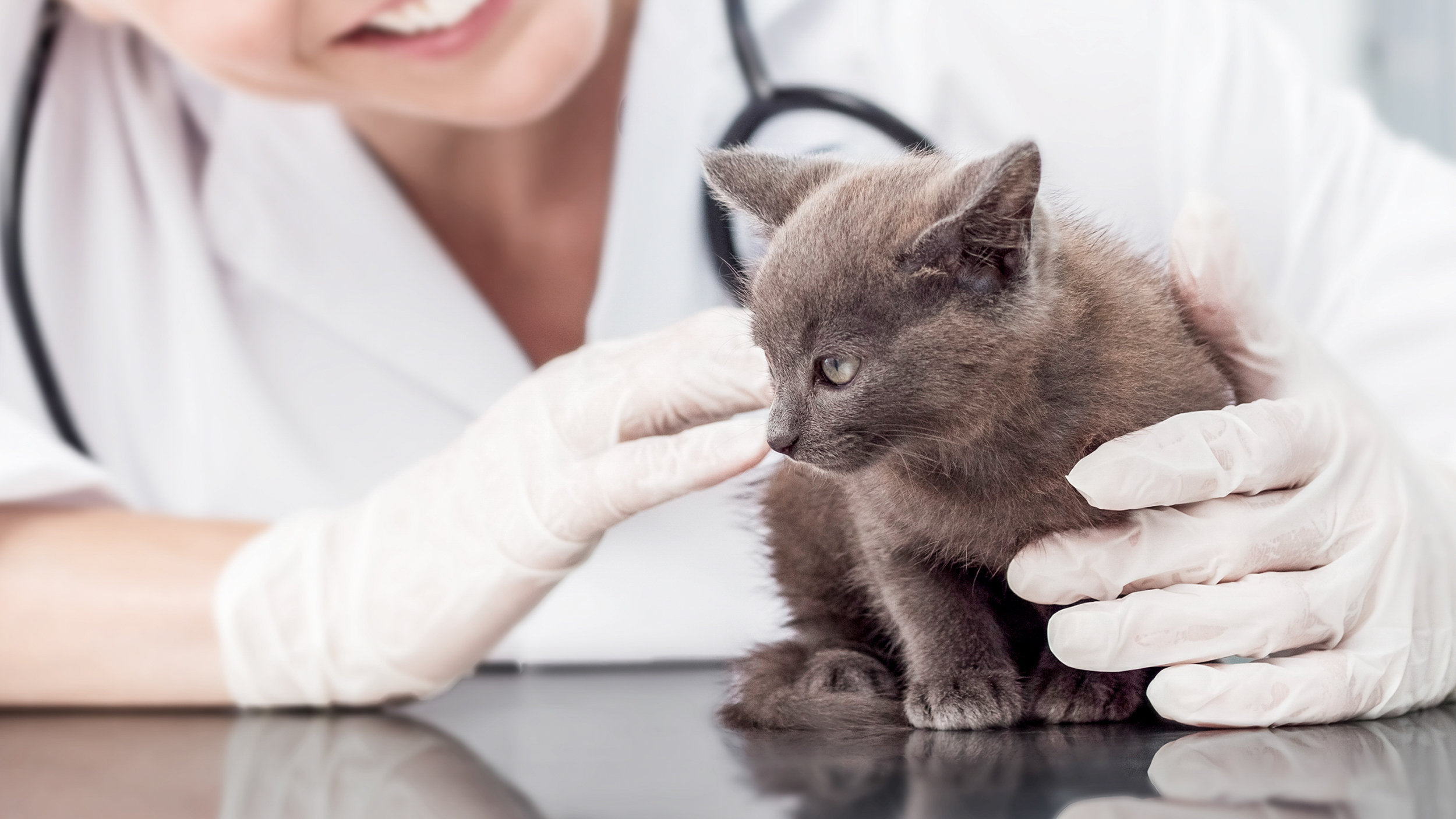Preparing for your kitten's first vet visit

You may already be used to the process of taking pets to the vet, but if not, then it's worth spending some time getting to understand the process and how to make sure your kitten is as comfortable as possible throughout.
How to choose your kitten's vet
When you first got your kitten, you may have been advised to keep taking them to the same vet. If this is not possible, for whatever reason, you will need to choose a clinic for your pet.
Things to consider when choosing a new veterinary practice are:
- The practice's local reputation
- How close to home it is
- How to get there
- If you can park easily
- If the clinic is clean and well-maintained
- If the pet's files are kept up to date
- Whether they send out reminders for vaccinations on health check-ups
- What preventative medicine programs they have in place
- The standard and range of equipment they have
- How they organize emergency or out-of-hours services
- Whether they offer nutritional advice for your pet
- If the approach is suitable for your cat's needs
For some time now, practitioners who are particularly aware of cats" special needs have adopted a "cat-friendly" approach. These clinics are designed around cats' needs, with surgery times or special waiting areas just for cats. There are soothing pheromone dispensers, diffuse lighting, a calm atmosphere, and an especially patient, attentive approach. All these elements allow vets, owners, and cats to have a consultation or receive care in optimal conditions.
When cats are really uncooperative, or perhaps even aggressive, during visits to the vet it's because they are frightened and have no other way of dealing with the "threats" they feel assaulted by.
What to do before your kitten's visit to the vet
Your vet will find your information, as the cat's owner, enormously helpful in deciding which vaccinations are required.
Before you visit, check your cat's Health Record Book. It can be helpful to write some information down, like your cat's diet (brand, quantity, etc.), drinking habits, environment, and whether you have noticed any eating, digestive, or behavioral changes.
Keeping a paper record of your cat's health history and past treatments can be very valuable—ideally, keep it in its health folder.
Transporting your kitten to the vet
For reasons of safety, your cat should travel in a specially designed car carrier. Ideally, this should be a familiar object for your kitten. To make things easier, if you are planning a visit to the vet soon, take the carrier out several days before the consultation, and leave it open in a corner of the house where your kitten likes to go.
You can spray soothing pheromones and put a blanket inside which already carries the cat's own scent—this will help your kitten get used to the box and feel safe, protected from prying eyes. If the cage has an open side, cover it with a blanket or a towel so that it less exposed.
How to handle your kitten at the vet
To limit the impact of a visit to the vet, there are some useful tips you can follow:
- In the waiting room, leave your cat in its basket, and put it on a raised surface like a chair.
- Try not to make any sudden movements, and take your cat out gently to put it on the examining table.
- Some cats feel reassured in their cage. If this is the case, take off the top part, so that the vet can reach the animal.
- Speak to your cat in a soft voice, and stay calm yourself. If you are agitated, your cat will feel it, and will become even more stressed.
- You can trust the professionals: your veterinary team are used to dealing with cats, even the least cooperative ones. If you try to intervene, not only will you be in the way, but you could get hurt.
- Some vets make house calls. In this case, shut the cat in just one room, preferably one without too many hiding places. Remember that some visits will certainly require you and the cat to go there instead.
- A frightened cat can make a condition even worse, especially if it has respiratory problems or has suffered an accident. Staying calm, soothing your cat by stroking, and using a soft voice is the best approach here.
- If your cat needs to be hospitalized, choose somewhere that takes cats' specific needs into account if you can. If the visit has been planned in advance, you can usually take your cat's cushion or favorite blanket, or even a piece of clothing that you have worn, which will consequently be infused with your scent.

Returning home from the vet
Most of the time, cats are delighted to be back in their own familiar environment. When you get back from the vet clinic, let your cat settle in calmly.
Cats (if they are healthy enough to do so) will certainly want to make sure that the furniture hasn't been moved around, that the yard is still there, and that the litter box is indeed theirs.
Very often they will inspect their favorite places and deposit their odor by rubbing their forehead, or sharpening their claws.
However, in homes with several cats, you will need to take a few precautions in order to have a happy and serene return to the feline community.
Reintroducing a your kitten to other pets
In well established groups of cats, each one knows the others and they have regularly exchanged olfactory signatures.
It can happen that a cat leaves the group temporarily and, when it gets back to the household, is no longer recognized by one or all of its fellow cats, which can cause anxiety or even fighting.
It is therefore necessary to take certain precautions when the traveler returns home again.
These precautions can be also used when introducing a new arrival for the first time, whatever his/her species:
- You need to first of all make sure that the atmosphere in the house is peaceful, by spraying synthetic pheromones.
- So that the new arrival has a "local" smell, you can rub it with a piece of cloth infused with the odor of a cat that has not left the household.
- If possible, place a cover used by cats who haven't moved, in the pet carrier, so that the homecoming cat recognizes the odor of its fellow cats.
A stressful encounter before, during or after a visit to the vet can leave a lasting impression on your kitten and make them more resistant to appointments in the future.
Taking these few simple steps to ensure this process is calm and stress-free will mean your cat will grow to be more comfortable and confident when visiting the vet in adult life.
Tailored nutrition for your kitten
Nutritional formulas that help to build your kitten's natural defences, support healthy growth, and aid in digestive system development.
Like & share this page